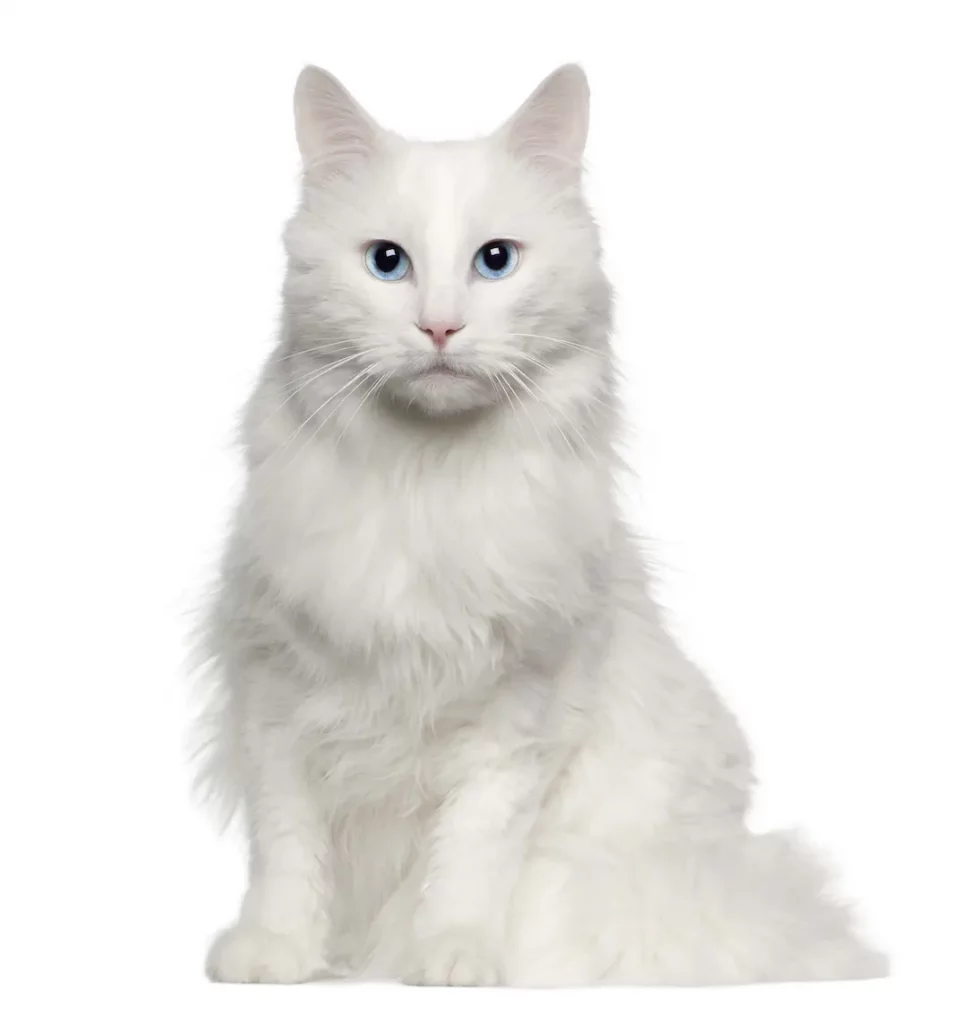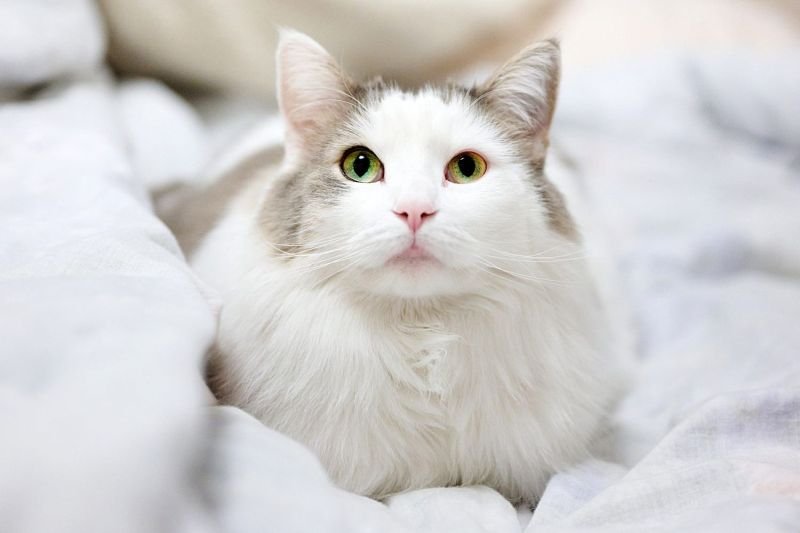
The regal and elegant Turkish Angora looks straight out of a fairytale. With its immaculate white silky fur, blue eyes you can get lost in, and a loving personality, it is no wonder the Turkish Angora is considered a national treasure of its homeland.
Contents
History
The Turkish Angoras have a rich and long history dating back to 16th century France where they were famously traded. This natural breed is named after the city of Angora (now named Ankara) in the harsh mountainous region of Turkey where this feline originated.
Following the birth of cat shows in the 19th century where Turkish Angoras were exhibited, the Persians began to breed them which led to their downfall. The cat breed became scarce and lost their identity.
Thankfully, the Turkish Angora breed was preserved through a breeding program in the Ankara Zoo.
They were first brought to the United States in 1954 and in 1968, the Turkish Angora was first recognized as an official breed by the Cat Fanciers’ Organization.
Obtaining a Turkish Angora
If you choose to buy from a breeder, check its affiliations first. Breeders should be recognized by reputable cat organizations such as The International Cat Association (TICA).
No one can warrant a kitten’s health when purchasing but getting one from a certified breeder certainly improves your chances. Responsible breeders have a commitment to ethical breeding which improves the odds of you raising a healthy and well-adjusted kitten.
Most breeders will vaccinate and spay/neuter the kitten before handing it to you. If you are a first-time cat owner, a responsible breeder will walk you through taking care of the feline. It will give you specific instructions and will answer all related questions.
You can purchase a Turkish Angora from a certified breeder for $1,000. However, Angora cats price could vary per state.
On the other hand, Oodle Marketplace has listed Turkish Angoras for sale and adoption; ranging from $20 to $1,000.
If you are low on budget or you want to improve the stray population, adopting a cat is the ideal solution. Check your local shelters, foster homes, and online adoption websites like Pet Finder if they have a Turkish Angora pure or mix bred available.
You will probably have to pay an adoption fee or donate a certain amount to the shelter before the adoption is finalized. However, most cats available for adoptions are adults that were given up or abandoned by owners.
Turkish Angoras are a sweet as they come so it does not matter at what age you will acquire them. Adults have a complete and distinct personality which you could benefit from, compared to getting a new kitty.
Appearance and Grooming
Turkish Angora cats are known for their long, fluffy coat that shimmers when they move and also regulates temperature, especially during winter. They have a medium size body that is long, svelte, and well-balanced.
With its slim legs, fine bones, long tail and coat, and large, wide eyes, the Turkish Angora is the epitome of grace.
The length of its coat is dictated by the season. In warm months, the fur tends to thin out and shorten, while in cold weather, the coat grows longer and thicker.
This breed only has a single-layered coat which makes it easy to groom and is less prone to matting and shedding.
Angoras are typically pure white. However, color variations and patterns exist. Odd-colored eyes are also seen in this breed – sometimes having one blue eye and one amber eye.
Its fur will benefit from weekly combing and also bathing every couple of months; particularly for white or lightly colored cats.
Nails should be trimmed every week or so. Make sure to brush its teeth for good oral health and fresh breath with a toothpaste approved by the veterinarian.
The following grooming items cost around $6 each:
- JW Pet Company GripSoft Cat Comb
- Monochef Pet Cat Nail Clippers
- Sentry Pentrodex Dental Kit for Cats

Personality and Enrichment
The Turkish Angora is not just a pretty face. It is athletic, inquisitive, and intelligent.
Its playful personality makes it endlessly entertaining and active. It is a very vocal cat that loves to talk.
Give it an ample amount of time and affection or else your cat will get bored and develop behavior issues.
To spark its instinct to hunt and explore, the Turkish Angora needs daily interactive play sessions. Provide toys and puzzles for entertainment when you are not home.
A perfect family pet, the Turkish Angora is very sociable and gets along well with children. It thrives in the company of other pets in the house as long as it is the center of attention.
If getting one from a breeder, do not forget to choose from one that raises cats in a home and handles them from an early age. Check its parent’s temperaments to have a glimpse of how your cat will be in the future.
Like all cats, Turkish Angoras are specific about bathroom hygiene and like a spotless litter box. If your household has multiple cats, it is recommended to provide one box for each cat and scoop the waste daily.
- LitterMaid Single Cat Self-Cleaning Litter Box (for cats under 15 lbs): $80 to $100
- Purina Tidy Cats Lightweight Clumping Cat Litter (17-lb. pail): around $21
- Atlantic Funny Cat Feather Toy: around $8
- SmartyKat Electronic Sound Cat Toys: around $5
Diet
Felines require a high protein diet so when buying cat food, look for those with significant protein content and are grain-free. An adult Turkish Angora can weigh between 6 to 9.9 pounds so be careful not to overfeed it so it does not gain too much weight.
Heavy cats, especially indoor ones, will have decreased agility and physical activity leading to obesity. To avoid this, purchase cat food specific to indoor cats that have a balanced amount of nutrients.
- IAMS Proactive Health Indoor Weight and Hairball Care Dry Cat Food (7-lb pack): around $14
- Hill’s Science Diet Indoor Dry Cat Food (15.5-lb pack): around $35
- Purina Friskies Indoor Adult Wet Cat Food (24 pk 5.5-oz can): around $13
- Wellness Kittles Crunchy Natural Grain Free Cat Treats (2-oz bag): $2.37
Health and Medical Care
Vaccinations and deworming are essential for the health of your pet. Deworming is especially important during the first few weeks of its life. Additionally, unwanted guests like fleas can be kept away with sprays and drops.
Just as all people are likely to inherit a disease, all cats also have the likelihood of having genetic problems. Not to worry; breeders will offer you a health guarantee on kittens, while shelters usually have a complete medical workup of the kitty.
Cats of this breed are generally healthy. However, the White Turkish Angoras with blue eyes are prone to deafness and the odd-eyed cats may have unilateral hearing loss. Nonetheless, deaf cats can get around well.
The most common feline disease is hypertrophic cardiomyopathy (HCM) or the thickening of the heart muscles, which could also develop in Turkish Angoras. As no one can guarantee that a cat will never have HCM, regular screening must be performed.
Visit your veterinarian regularly and be sure to keep your cat up-to-date on vaccinations.
- Spay: $60 to $150
- Neuter: $50 to $100
- Microchip: $15 to $25
- Healthy Cat Vaccination Package (FVRCP vaccine. FeLv vaccine, round/hook dewormer): $59 to $135
- Rabies (1 or 3 years): $15 to $20
- Annual Cat Package (physical exam, rabies vaccine, FVRCP vaccine, and fecal test): $85 to $130
Remember that getting a cat is like having a new member of the family. You will need to care for it and love it like you would a child.
Turkish Angoras at not hard to love. Their affectionate and gentle personality, as well as their independence, make them the best pets.
Turkish Angoras love to be treated like a true alpha cat – it will participate in all of your activities and constantly ask for your attention. Indeed, this feline breed will be a fine addition to your household.
